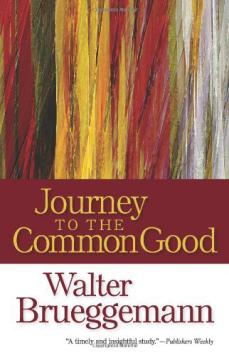Journey to the Common Good
By Walter Brueggemann (Westminster John Knox, 2010)
 In this compact study, biblical theologian Walter Brueggemann traces a remarkably similar pattern of cause and effect between the crises in today’s world—chronic war-making, ecological destruction, economic injustices—and the defining events in Jewish tradition.
In this compact study, biblical theologian Walter Brueggemann traces a remarkably similar pattern of cause and effect between the crises in today’s world—chronic war-making, ecological destruction, economic injustices—and the defining events in Jewish tradition.
Brueggemann’s central focus is the Exodus-Sinai story, visited liturgically by Jews as a perennial reminder that “you were once a slave in the land of Egypt.” But his is not the customary religious approach to this narrative. Rather, Brueggemann analyzes its political, social, and economic elements, using the themes of scarcity, anxiety, abundance, and neighborhood.
In both the Pharoah’s Egypt and today’s world, there is anxiety about not having “enough,” anxiety that fuels today’s materialism and militarism. We ever feel that we need more—luxuries, status symbols, weapons, military bases. A privileged few exploit those upon whose compliance and labor their privileges depend.
Yahweh heard the cries of the enslaved Hebrew immigrants in Egypt and provided abundant food as he led them on a journey through the desert. Neighborliness became the antidote for scarcity and anxiety. Later Pharoah’s injustices were duplicated by Solomon, whose wealth, power, and political wisdom were never “enough.”
Along this path of corruption, a prophetic tradition was born. Commonly considered purveyors of doom and gloom, the Hebrew prophets were also harbingers of hope, pointing out alternatives to the status quo. Brueggemann mines their hopeful messages and shows how they apply today.
Brueggemann sees the Bible as “an imaginative narrative of God’s staggering care for the world, a narrative that . . . builds community precisely by respect for the liberty of [all persons].” That view is evident in this book.
This article appeared in the February 2012 issue of U.S. Catholic (Vol. 77, No. 2, page 58-59.)












Add comment